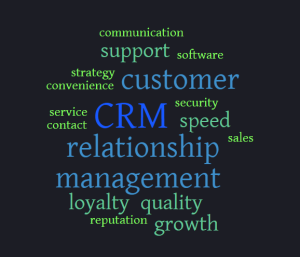
When I was asked to write a blog entry about Customer Relationship Management (CRM), I had a stream of thoughts on this now-ubiquitous technology that nearly every organization has in some form or fashion. As a vendor of a world-class CRM which resides on the IBM platform, I looked no further than our own experience using (and helping customers acquire) CRM technology. I began to reflect on the most powerful features and benefits of a CRM system.
What drives an organization to use CRM in the first place? We’ve found that it’s most often things like high customer churn, inefficient processes, poor lead conversion and unreliable reporting. But once companies become invested in their CRM technology, it’s up to them to get the most out of it. There are many ways to really juice the most out of your CRM, but in reflecting, these are probably the most potent.
Allow the CRM to be Your Administrative Assistant
From calendaring your appointments to reminders about important action items, your CRM has unbelievable capacity to help streamline your activity. Most CRM tools give you the ability to take copious notes, file important documents, and a multitude of other tasks an administrative assistant would normally handle.
Add Fields that Give Your Sales Prospecting and Customer Experience a Personal Touch
It’s a simple move but one that can pay huge dividends. In this world of automated digital marketing where canned messages are thrown around like candy, a simple personal touch to your interaction with sales prospects can be all the difference. Make a field for things like the prospect’s birthday or their interests, or any number of things. Mention those things in communications with them, where applicable. Did John at ABC Company mention that he was out on the golf course yesterday? Record it in your CRM and now you have the information to send him some golf balls with your proposal to make a big hit.
If You’re Not Using Your CRM for Cross-Selling and Upselling, You’re Missing Out
With the help of relational data connections, CRM makes it super-simple to give you direction on what a customer bought, their buying behavior trends, etc. Why not build in logic that prompts you to offer certain complementary products? Create a trigger that suggests other products or services when certain buying behavior criteria is met. Let your CRM show you what they have and where they’re going and lessen the burden on your Sales Engineers.
Maximize Internal Information Sharing
With CRM technology, sharing information internally becomes a snap. Do you need to team up with your Sales Engineer on a particular document? Create a protocol within your CRM to share information with him. Do you need the Sales department to provide feedback on the sales leads it’s receiving from the Marketing department? Create a shared survey that Sales can fill out that is visible to Marketing. Do you have six internal stakeholders working on the same sales proposal? Silo it in your CRM for easy collaboration.
Secure Your Data at All Costs
Whether we’re talking about cloud-based CRM or on-premise solutions, protecting your data is of the utmost importance. In 1990, a jaded employee could walk right out the door with a list of clients in tow. It’s not as easy now. You can monitor who is exporting information, who is viewing which records, etc. In addition, threats from external attacks can be thwarted with the security CRM provides. It’s especially secure when you have an on-premise solution.
Regardless of the CRM Features, You Have to Make it Your Own
Building your CRM solution is a never-ending process. Your business needs and processes change often, so why shouldn’t your CRM? Build in information, workflows, and processes that are as unique as your business is. A highly customized CRM solution becomes a hard asset on the balance sheet because of how unique it is to your business.
About the Author
 David Downes is the Director of Strategic Planning at DPS. Established in 1972, DPS, Inc. is a software development, consulting, and services company. DPS is a proven partner in providing tailored technology in the form of easy-to-use, reliable, well-supported, and cost-effective business software solutions, primarily for the wholesale distribution industry. DPS promotes only tested and proven technology to our clients — technology that works for wholesale distributors. As the developer, marketer, and implementer of the DPS Product Suite, DPS assures reliability and ROI without all the hassle of managing multiple vendors and non- compatible systems. The Product Suite for Wholesale Distribution includes complete distribution and financial management (ERP), web-based customer self-service (eCommerce), advanced warehouse management (WMS) with bar-coding and wireless terminal/scanners, and mobile computing for sales reps and delivery drivers on the road. Connect with David Downes on LinkedIn. Connect with DPS on LinkedIn.
David Downes is the Director of Strategic Planning at DPS. Established in 1972, DPS, Inc. is a software development, consulting, and services company. DPS is a proven partner in providing tailored technology in the form of easy-to-use, reliable, well-supported, and cost-effective business software solutions, primarily for the wholesale distribution industry. DPS promotes only tested and proven technology to our clients — technology that works for wholesale distributors. As the developer, marketer, and implementer of the DPS Product Suite, DPS assures reliability and ROI without all the hassle of managing multiple vendors and non- compatible systems. The Product Suite for Wholesale Distribution includes complete distribution and financial management (ERP), web-based customer self-service (eCommerce), advanced warehouse management (WMS) with bar-coding and wireless terminal/scanners, and mobile computing for sales reps and delivery drivers on the road. Connect with David Downes on LinkedIn. Connect with DPS on LinkedIn.
